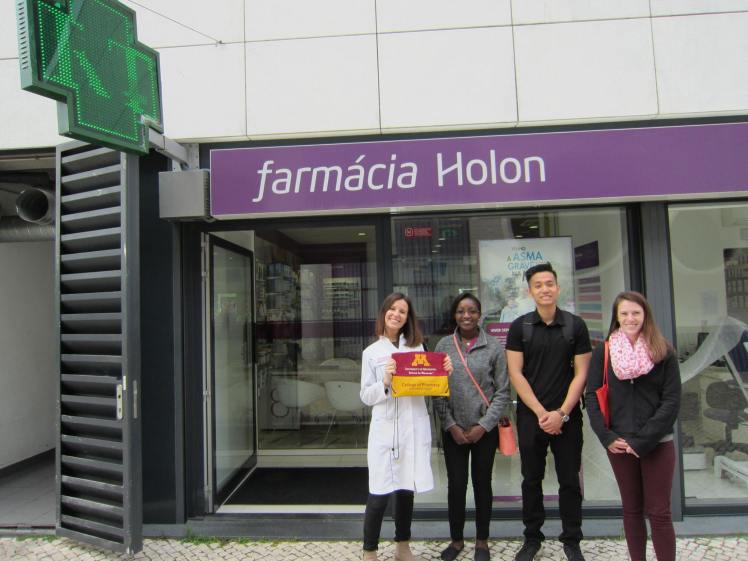We continue our series on innovation in electives by profiling an international elective, Portugal: A Study in Comparison. This course is led by Dr. Julie Johnson and Dr. Jason Varin. In addition this course is made possible due to a partnership with a pharmacist in Portugal, Ema Paulino, who is a leader in pharmacy and advocacy. Portugal provides a great opportunity for our UMN-COP students because of the robust and interesting pharmacy landscape in Portugal, as well as the fact that many individuals in Portugal also speak English.
This elective course, open to second and third year pharmacy students, is one of several opportunities for UMN-COP students to participate in global health activities. The American Association of Colleges of Pharmacy (AACP) has identified global and international pharmacy education as a growing priority. The global pharmacy education special interest group describe several benefits of exposing pharmacy students to global health and international pharmacy, such as increasing students’ cultural competency and encouraging students to adopt a more global mindset. As the role of pharmacists expands worldwide, creating connections allows for pharmacy and pharmacy education to establish common competencies across borders.
Dr. Jason Varin talks about the design and impact of the course,
“While the thought process was to familiarize the student with healthcare delivery in another country, I feel the comparative assignment creates a situation where the student also learns much about our system here as well.”
This course uses a comparative structure. Before the trip, students spend time learning about pharmacy regulations, legislature, waste management, advocacy, independent pharmacies and pharmacist provided care in the United States and in Portugal. Then, during the two weeks in Portugal, students are immersed in the Portuguese culture and are able to visit local pharmacies, speak to pharmacy leaders and spend time with Portuguese pharmacy students.
Several students commented that learning about pharmacy in another country caused them to think more deeply about pharmacy and pharmacy services in the United States. In addition, students commented that they realized how much they had learned about the United States (US) Health Care delivery system and pharmacy landscape, when it was their turn to teach Portuguese pharmacy students.

Recent Graduate Dr. Dema Mohamed commented on her learning:
“The biggest difference I noticed between pharmacy in the US and pharmacy in Portugal is in community pharmacy. All of their community pharmacies are independently owned whereas in the US finding independently owned pharmacies is a bit of a struggle and they continue to go out of business…Within their community pharmacies, pharmacists are able to do the following in addition to dispensing medications and counseling their patients on the medications: conduct various health assessments related to diabetes and cholesterol, hearing, skincare checks, obtain labs, nutrition checks, schedule exams for their patients, administer vaccines and other injectable medications, and have pharmaceutical consultations similar to MTM visits in the US. “

Fourth year student Vu Ha explains how this elective has shaped his pharmacy education:
“This unique experience to take an international pharmacy education elective was truly eye-opening and changed the way that I viewed how pharmacy practice is accomplished differently throughout the world. Pharmacy is still a blooming profession not only in the US, but for other countries as well. This results in virtually endless opportunities to be an effective partner to any health care team. There has also been significant strides by Portugal and European Union to keep their curriculum universal so that their graduating pharmacists can relocate to any approved country”
We are thankful for these continued connections with Portuguese pharmacists and the opportunity for our students to broaden their knowledge and perspectives on the impact of pharmacy near and far.